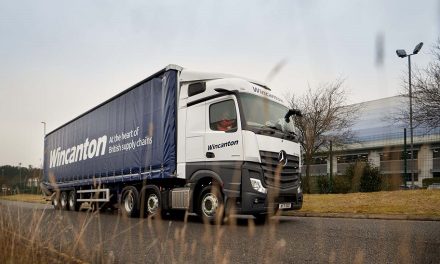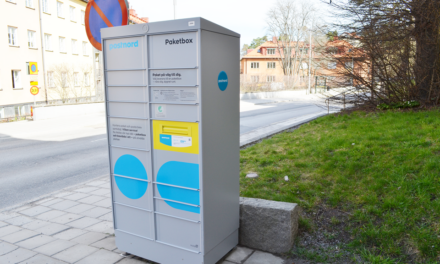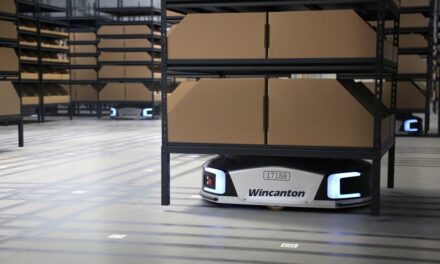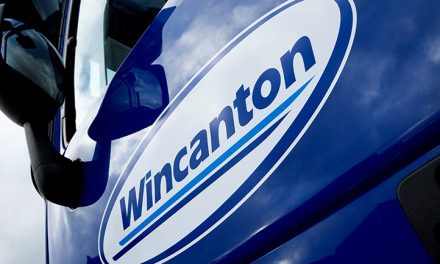
EU Enlargement – Mixed feelings about end of trade barriers
Transport companies operating in central and eastern Europe are looking forward to a boom in business as their countries join the EU. However, some are concerned about international competition, writes Paul Sandle
On 1 May the centre of gravity of the EU will shift east as 10 countries, mainly former communist states in eastern Europe, join the club.
However, for the 76m people living in the new member states, the move is less of a lurch and more of a natural realignment, putting them back at the centre of Europe politically as well as geographically.
The logistics and express industries will be among the first to experience the effects of joining the single market.
On the day of accession to the EU, customs controls between the new members and the existing union will be abolished in one fell swoop.
These changes will reverberate through the countries at the edge of the existing borders of the EU as well as the new members. A total of 22,000 people will lose their jobs in customs control, with Germany, Austria and Hungary bearing the brunt of the losses, according to the European Freight Forwarders Association, Clecat.
But while in the long term the single market will increase opportunities for the freight transport sector in central Europe, gaining EU admission has meant adopting a raft of changes in legislation, regulations and tax regimes, a process that has been going on since the countries achieved candidate status in 1996.
The economic changes will see wages and costs increase – at present employing a person in Poland is one-tenth of the amount it costs in Germany. In turn that will drive inward investment in manufacturing further east to Romania, Bulgaria and Ukraine, and outside Europe to Asia and Latin America.
Transport companies in Poland, the Czech Republic, Slovakia and Hungary are positioning themselves to take advantage of this trend.
"Several different gateways to eastern Europe are vying to be most efficient, " says Dino Sarpa, VPof Europe sales at Menlo Worldwide, adding that the best hub has not yet emerged.
Logistics companies in central Europe have become accustomed to change; the industry has been transformed since the countries emerged from the shadow of Moscow in 1989.
Individual operators with one or two trucks replaced the state-controlled hauliers, and all of the big European players invaded, hot on the heels of major consumer goods companies which were eager to grab a slice of the new markets.
Poland, the Czech Republic, Slovakia, Hungary and Slovenia were keen to establish their own national identities within the EU, but multinationals are already taking a more regional view.
Tibbett & Britten, the UKbased global logistics company, serves the Czech Republic and Slovakia as a single region, says MD Roger Johnson. The company offers a full range of logistics services, but its strongest suit has been in food logistics, where it has gained Tesco and Spar as customers. It set up a cross-dock point in Prague three years ago linked to Pohorelice in the Brno area and Topolcany in Slovakia.
When customs controls at the Austrian borders are abolished more companies will relocate distribution centres to the Czech Republic and Slovakia to serve the whole region, he predicts.
"There's a logistics golden triangle for central Europe, with Vienna, Bratislava and Brno at its points, " he says.
Wincanton, like T&B, views the Czech Republic and Slovakia as one market because of similarities in customs procedures and language.
It also sees logistics moving from a country-by-country basis to a regional approach.
"We are seeing many requests to deliver to many countries from one point, for example, using Bratislava to serve the Austrian and the Czech markets, " says Petr Michalek, MD of Wincanton CZ.
Across the border in Poland, Wincanton is also experiencing the trend towards regional logistics.
"Our customers are mainly multinationals such as Philips, Sony and Thomson in consumer electronics, Cussons in personal hygiene and Hipp in baby foods, " says Jan Hoheker, logistics and business development manager, Wincanton Poland.
"More and more clients are interested in a regional scope, " he says. Philips, a long-term customer, has recently asked the company to devise a regional distribution pattern, serving parts of the Czech Republic from DCs in the south of Poland.
"The future lies in multicountry projects, offering customers all services in all markets, " says Michalek. "We are working very closely together on projects for Philips and Thomson – we are speaking to each other on a daily basis." He points out that the company has a common IT platform for Poland, the Czech Republic, Slovakia and Hungary.
Another target is domestic Polish manufacturers and retailers. Traditionally they owned their own transport companies, he says, but they are becoming more and more interested in outsourcing logistics so they can concentrate on their core activities. Wincanton recently signed a deal with Lakma, a maker of household cleaning products in Poland.
His counterpart at the Czech division of Wincanton faces the same challenge. The current situation is that almost all international companies are using 3PLs, whereas many domestic producers are still using their own transport resources, Michalek says.
"It's harder than discussions with international companies, " he says. "We have to persuade Czech companies that outsourcing is profitable." Hoheker expects wages to go up after accession, mainly because of higher costs after joining the EU, but he says the exodus of companies further east has been exaggerated.
"The countries in the east, such as Ukraine, are not stable, " he says. "Many companies have gone east but have come back and decided to access the markets further east from the Czech Republic and Poland." Exel is a relatively latecomer to the Polish market, although it has had agents in the country for some time. It established its business in Warsaw at the start of the year, using its partnership with US aircraftengine manufacturer Pratt & Whitney as a bridgehead to establish in the country.
"We are focusing on global suppliers who are looking for standards comparable to the best in the West – class A warehousing and technology, " says Jerzy Korzycki, general manger Exel Poland. "We are not competing with trucking companies. Customers come to us looking for a complete supply chain solution." The end of customs regulations will also have a big effect on the largest distribution company in Poland, Spedpol, which will be swallowed by its international sister company, Schenker.
The two companies have cooperated on an exclusive basis since 1991, when Spedpol was established. "From the point of view of customers there will be no change, " says Jacek Machocki, president of Schenker Poland. "Imports from Schenker were always distributed in the domestic market by Spedpol and viceversa.
"After EU entry we will just break the fence because customs clearance will no longer be a barrier. We will have the same system for international and domestic groupage." The company grew quickly by selling everything to everybody as the country's economy rapidly expanded post-communism. "We decided to redefine our products and our tariffs and in the process lost more than 2,000 customers who we didn't want to serve any longer, " says Janusz Gorski, president of Spedpol. "On the one side we increased tariffs and on the other we offered value-added services." One Polish haulier who has made a success of accessing international markets is Marek Chyla of BUS, which is an agent of independent freight forwarder FS Mackenzie.
His relatively small company has the advantage of knowing Poland's complex customs rules inside out.
"Customs procedures are very strict in Poland, more so than in Hungary and the Czech Republic, " he says.
"Procedures change every few months and different customs officers interpret the rules differently." The fact that he will lose this advantage when Poland joins the EU worries him.
"After 1 May, border procedures will be simple, making transit times much shorter, " he says. "This means international operators will be able to make more journeys using the same number of vehicles, which will drive costs down and ultimately lower margins." He also expects to face greater competition from companies within the union, particularly some in Germany, which have previously ignored central Europe because of the long waiting times at the borders.
But Polish international operators are buying up lots of new trucks in order to compete in the single market, where they will no longer need permits if they have the newest and cleanest vehicles.
Chyla plans to enrol his Dutch partners in helping him to get international business. "Our drivers are very open to doing international work, " he says.
"The UK haulage industry should expect big competition in the future." Opening up the international market will make a big difference to Czech hauliers as well, according to Cesmad Bohemia, the Czech Republic's road haulage association. "Margins in the domestic market are under a lot of pressure, caused by too many entrants to the market in the liberalisation of the early 1990s, " says secretary general Martin Sprynar. "We still have oversupply. Some small companies are just surviving and are not thinking about the future." Germany and Austria have been flexing their influence in getting international operators in the Czech Republic to renew their fleets but, in return, operators have had little opportunity to access international markets because of a lack of permits, Sprynar says. "The requests for permits were 20 times higher than the number available, " he says.
He supports the higher regulatory standards that EU entry will impose on the Czech government. "If a Czech haulier makes an infringement in Austria or Germany they have to pay t2,300, " he says. "Here the maximum penalty is t60-70, which is nothing for a German driver." Karoly Szabo, MD of Eurogate Hungary, an international freight forwarder established in Hungary and the UK in 1989 and now specialising in central Europe, thinks the major effect of joining the EU will be the ending of bilateral agreements and the ending of permits for international transportation, of which Hungary is limited to just 4,800. This will increase competition in international haulage and depress prices.
He believes that it is vital to adapt to the changing patterns of inward investment.
"As the economic and political borders move further eastwards, so multinationals will move east, " Szabo says.
"As far as the infrastructure goes, the condition of roads in eastern Europe is very poor, giving the countries of central Europe an opportunity to store and distribute goods from the west.
"The companies which only serve the Hungarian market from Hungary will not survive, " he predicts. "The future will be about modular development; how to fit things together in different countries.
"Bulgaria, Romania and Serbia are all open countries and Hungary is in a key position to serve them, " he says. "It's a chance that will never come again." However, Miklos Hifner, MD of Hungarian Road Haulage Association, doubts that many domestic haulage companies will immediately move into the international market. "The majority of domestic companies are not looking to start international services, " he says. "Most are undercapitalised, and there will be no big bang on 1 May." Some Hungarian operators not competitive enough in the EU will turn to the eastern market, he believes.
Cargo Partner, the Viennabased freight forwarder, is also using the abolition of customs controls to change its network. Christoph Grasl, MD of the Hungarian operation, says shipments will switch from air freight to the road as a result of the cut in waiting times at borders.
Although everybody know that customs controls will change on 1 May, none of the governments in the region has been forthcoming on the details, with Poland facing the biggest revolution in procedures.
"Czech customs have always been simpler than Poland's because the Czech and Slovak systems are based on French customs, " says Michalek. "The headlines are quite clear, but everybody is missing the details, " he adds.
The Czech Association of Freight Forwarders has filled the information void left by the national government. Its executive director, Jiri Kladiva, points out that the organisation has its finger on the pulse of European legislation through its membership of Clecat and Fiata, but most trade organisations in the region cannot afford to join.
One industry that should be relatively unscathed by the shift in manufacturing further east is automotive.
Carmakers were attracted to the region by the combination of low wages and guaranteed access to EU markets. Poland, the Czech Republic, Slovakia and Hungary produce more than 1m vehicles a year, bringing business for component manufacturers and logistics companies to deliver to the plants.
The major recipient of the funding has been Slovakia, which produces more vehicles per head of population than anywhere else in the world.
"Slovakia used to make tanks for the Soviet Union in the Stalin era, " says Kladiva.
"Now it is set to be the biggest car manufacturer in Europe." Kia Motors, part of South Korea's Hyundai group, recently selected Slovakia over Poland to site a car plant – joining Peugeot-Citroen and Volkswagen, which is the country's largest exporter.
The German company also manufactures in the Czech Republic and Hungary, while Fiat and Daewoo are the biggest investors in Poland's manufacturing industry.












